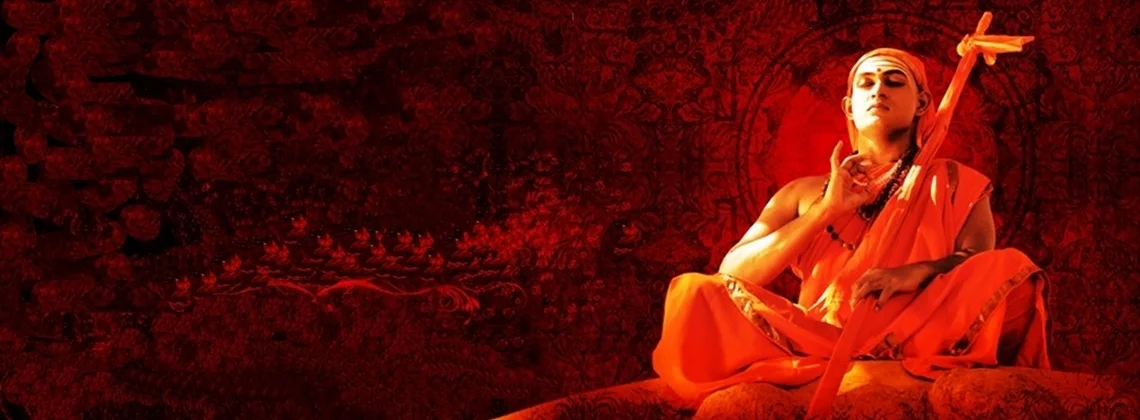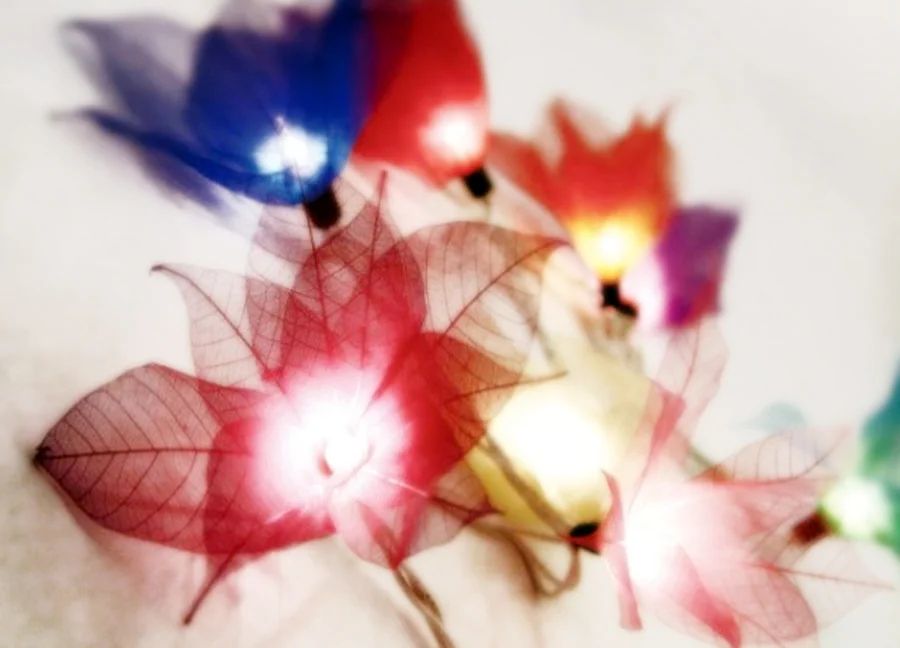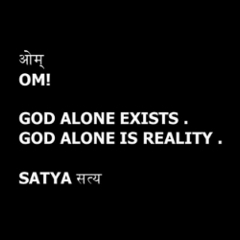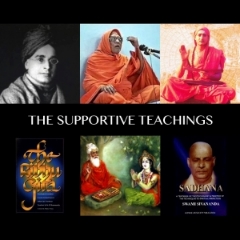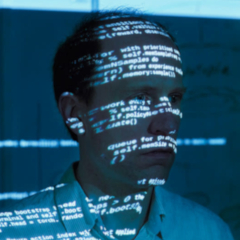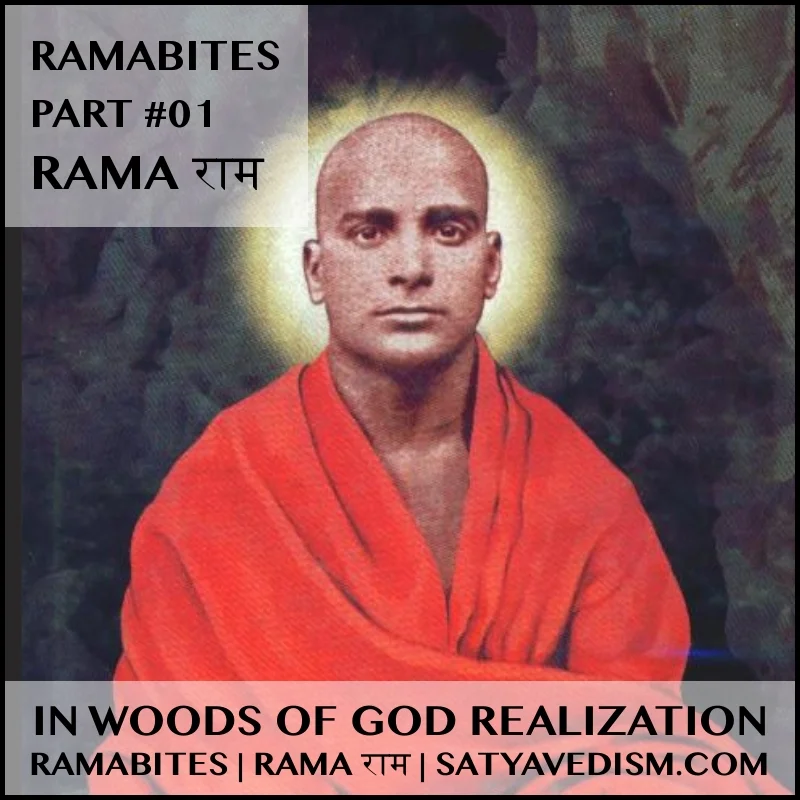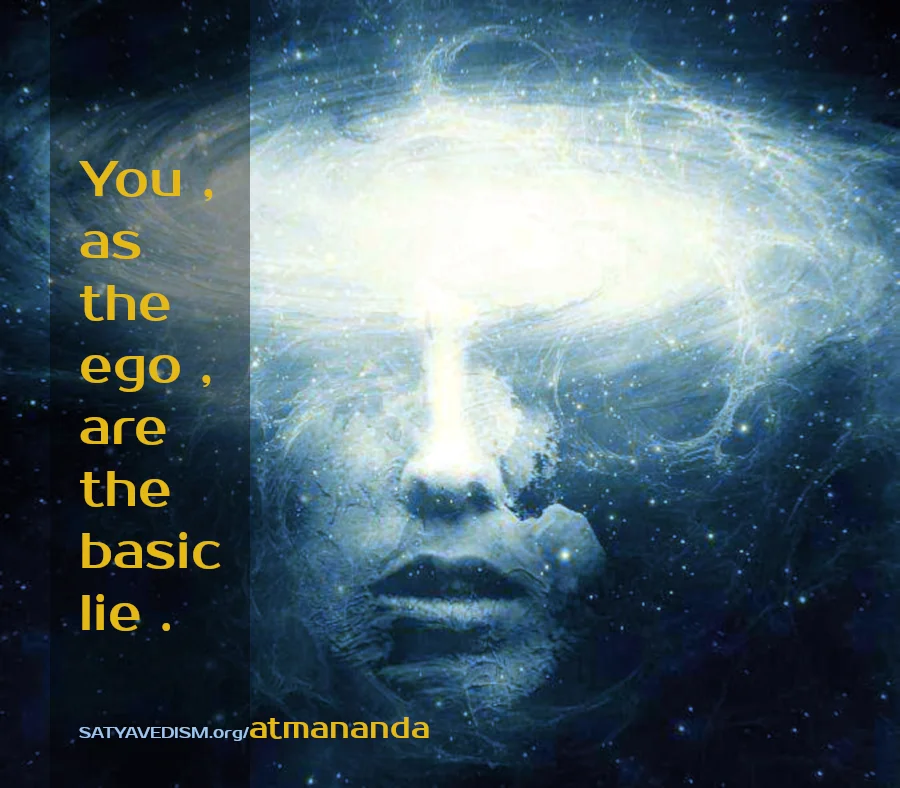BRAHMA SUTRA BHASYA | I.III.06.22+23
| | homeBRAHMA SUTRA BHASYA | I.III.06.22+23 | SANKARACARYA
|| CHAPTER I | SECTION III | TOPIC 06 | VERSE 22 ||
|| TOPIC 06 | ACTING IN ACCORDANCE ||
Because of the fact of acting ( ie shining ) in accordance , and because of the use of the word " Its " , ( the Light mentioned in the Mundaka Upanisad must be BRAHMAN ) . || 22 ||
|| BHASYA ||
DOUBT : The Upanisad reads thus :
" There the sun does not shine , nor the moon or the stars ; nor do these flashes of lightning shine there . How can this fire do so ? Everything shines in accordance with Its shining ; by Its light all this shines diversely " ( Mu . II . ii . 10 ; Ka . II . ii . 15 ) .
Now the doubt arises with regard to this text as to whether the entity in whose wake all these shine and through whose light all this shines diversely , is some natural lustrous matter or the conscious Self .
OPPONENT : When in such a predicament , the conclusion is that it is some lustrous matter .
Why ?
Because what is denied is the shining of lustrous entities like the sun etc , it being well known that the luminaries — moon , stars , etc — do not shine in the daytime when the bright sun keeps shining .
Similarly it can be understood that the luminous substance in whose presence all these moon , stars , and so on cease to shine together with the sun , must be by nature a luminary .
And " shining in accordance with another " also fits in with the assumption of a natural luminary ; for action in imitation is seen in the case of things of the same nature , as for instance , in the act of following someone going ahead . Therefore it must be some natural light .
VEDANTIN : Under such circumstances we say : It must be the conscious ( self-luminous ) Self .
Why ?
Because of " acting in accordance " , which phrase means imitation . This shining in imitation , as implied in " It shining , all this shines " , fits in exactly if the conscious Self is accepted ; for the conscious Self is mentioned in the Upanisad as " luminous by nature and having true resolve " ( Ch . III . xiv . 2 ) .
For it is not a matter of experience that the sun and other things shine in accordance with some other shining substance . The luminaries like the sun etc are similar in nature , so that they do not have to depend on some other luminary , in accordance with which they have to shine . For a lamp does not shine in imitation of another lamp .
As for the assertion that acting in imitation is seen in the case of things of the same nature , there is no such hard and fast rule ; for action in imitation is seen in the case of dissimilar things as well .
For instance a red-hot ball of iron simulates fire and burns things in accordance with the fire's doing so . Or take another illustration : The particles of earth blow about as the wind does so .
By saying , " Because of the fact of acting in accordance " , the aphorist suggests " shining in accordance with " .
And by the words " and " " Its " , the aphorist refers to the fourth line of this verse , " by Its light all this shines diversely " , where also it is stated that the shining of the sun etc is caused by the Lord , and thereby the aphorist points to the conscious Self .
Besides , they ( the followers of the Brhadaranyaka Upanisad ) read thus of the conscious Self :
" Upon that immortal Light of lights . . . meditate as longevity " ( IV . iv . 16 ) .
It is against experience and a contradiction in terms to say that the luminaries like the sun etc shine variously with the help of another light , for one light dims out the other . Or it may be that it is not merely the diverse shining of the sun etc , enumerated in the text , that is caused by It .
What else is illuminated by It ?
From the text " all this " ( Mu . II . ii . 10 ) , used without any reservation , it follows that the manifestation , noticed in the cases of all these names , forms , actions , and results , is caused by the existence of the light of BRAHMAN , just as the revelation of all kinds of colour is caused by the existence of the light of the sun etc .
And by the use of the word " there " in the verse , " There the sun does not shine " etc ( ibid ) , it is shown that the subject matter already under consideration is to be accepted . The subject matter that is being dealt with in the verses , " On which are strung heaven and the earth and interspace " ( Mu . II . ii . 5 ) etc , is BRAHMAN .
Subsequently also , it is said ,
" In the supremely bright sheath * is BRAHMAN , free from taints and without parts . It is pure * , and It is the Light of lights . It is that which the knowers of BRAHMAN realize " ( Mu . II . ii . 9 ) .
To show how BRAHMAN is the Light of lights occurs the verse , " There the sun does not shine " etc ( Mu . II . ii . 10 ) .
It was also argued by the opponent :
Just as it can be held that no other light can shine in the presence of the sun , so also the denial of illumination by the luminaries like the sun etc is possible if there be some other entity which is itself a luminous principle .
As to that , it was shown by us even earlier that It ( The Lord ) alone and nothing else can be that luminous principle * .
It is proper to deny that they can have any illumination even in respect of BRAHMAN ; for whatever is perceived is perceived through the light that is BRAHMAN , but BRAHMAN is not perceived through any other light , It being by nature self-effulgent * .
On a contrary supposition alone , the sun and the rest could illumine It . BRAHMAN reveals all others , but BRAHMAN is not revealed by them , as is shown in the Upanisadic texts ,
" It is through the light of the Self that one sits , ( goes out , works , and returns ) " ( Br . IV . iii . 6 ) , " It is imperceptible , for It is never perceived " ( Br . III . ix . 26 ) , and so on .
|| CHAPTER I | SECTION III | TOPIC 06 | VERSE 23 ||
|| TOPIC 06 | ACTING IN ACCORDANCE ||
Moreover , ( this aspect ) is mentioned in the Smrti . || 23 ||
|| BHASYA || : Moreover , in the Smrti this aspect is mentioned as belonging to the conscious Self , as in the Gita ,
" That the sun illumines not , nor the moon , nor fire ; that is My Supreme abode , going whither they return not " ( BG . XV . 6 ) ,
and
" The light which residing in the sun illumines the whole world , that which is in the moon and in the fire — know that light to be Mine " ( BG . XV . 12 ) .
|| NOTES || :
* The blissful sheath which is higher and brighter than the other sheaths — bodily , vital , mental , and intellectual .
* Taintless — free from adventitious defects ; pure — free from natural defects .
* If there can be some light in whose presence the sun etc can be dimmed , then the opponent can raise the question , " Is it that light or some other light that is mentioned here ? " As a matter of fact , the Upanisad mentions only BRAHMAN , so that the question of any other light cannot arise at all .
* The opponent is misled by thinking that the word tatra in the text — " Na tatra suryo bhati — there the sun shines not " — means , " If It be there " , that is to say , " in Its presence " ; and so the opponent argues , " If BRAHMAN be there and nothing can shine in BRAHMAN , then the sun etc will never shine , for BRAHMAN is eternally present " .
The Vedantin says , " Tatra means , with regard to that as an object " . So the idea is , " BRAHMAN is not an object that can be illumined " . The locative case in tatra is not sati-saptami , but visayasaptami . )
SOURCE | SATYAVEDISM.ORG
